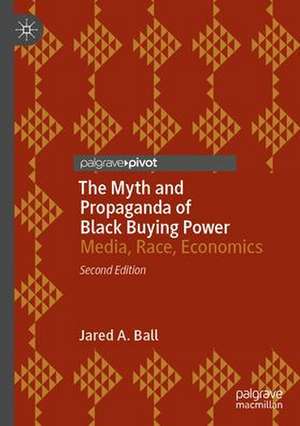The Myth and Propaganda of Black Buying Power: Media, Race, Economics
Autor Jared A. Ballen Limba Engleză Hardback – 31 mai 2023
Preț: 351.66 lei
Nou
Puncte Express: 527
Preț estimativ în valută:
67.29€ • 70.26$ • 55.57£
67.29€ • 70.26$ • 55.57£
Carte tipărită la comandă
Livrare economică 15-29 aprilie
Preluare comenzi: 021 569.72.76
Specificații
ISBN-13: 9783031265488
ISBN-10: 3031265483
Pagini: 133
Ilustrații: XIX, 133 p.
Dimensiuni: 148 x 210 mm
Greutate: 0.34 kg
Ediția:2nd ed. 2023
Editura: Springer International Publishing
Colecția Palgrave Macmillan
Locul publicării:Cham, Switzerland
ISBN-10: 3031265483
Pagini: 133
Ilustrații: XIX, 133 p.
Dimensiuni: 148 x 210 mm
Greutate: 0.34 kg
Ediția:2nd ed. 2023
Editura: Springer International Publishing
Colecția Palgrave Macmillan
Locul publicării:Cham, Switzerland
Cuprins
Chapter 1. Introduction.- Chapter 2. Propaganda Versus Economics: Constructing a Myth.- Chapter 3. Buying Power Not Protest: The Myth Prevents Unrest.- Chapter 4.The Myth’s “BIG THREE” Modern Purveyors: Reviewing Selig, Nielsen, McKinsey & Co.- Chapter 5. The Myth at. Play: A Most Suitable Environment.- Chapter 6. Cryptoganda: The Newest Bottle for Very Old Brandy.- Chapter 7.Freedom Was the Call But “Instead They Got a Bank!”.- Chapter 8.Conclusion: Policy and Organization Versus Economics.
Notă biografică
Dr. Jared A. Ball Professor of Africana and Communication Studies at Morgan State University in Baltimore, MD. and host of the “iMiXWHATiLiKE!” podcast. His decades of journalism, media, writing, and political work can be found at imixwhatilike.org. Ball has also been named as one of 2022’s Marguerite Casey Foundation’s Freedom Scholars.
Textul de pe ultima copertă
The second edition of this Palgrave Pivot offers a history of and proof against claims of "buying power" and the impact this myth has had on understanding media, race, class and economics in the United States. For generations Black people have been told they have what is now said to be more than one trillion dollars of "buying power," and this book argues that commentators have misused this claim largely to blame Black communities for their own poverty based on squandered economic opportunity. This book exposes the claim as both a marketing strategy and myth, while also showing how that myth functions simultaneously as a case study for propaganda and commercial media coverage of economics. In sum, while “buying power” is indeed an economic and marketing phrase applied to any number of racial, ethnic, religious, gender, age or group of consumers, it has a specific application to Black America. A new foreword by Dr. Darrick Hamilton, Henry Cohen Professor of Economics and Urban Policy at the New School (in New York, USA), and a new chapter on cryptocurrencies are included in this new edition.
Dr. Jared A. Ball Professor of Africana and Communication Studies at Morgan State University in Baltimore, MD. and host of the “iMiXWHATiLiKE!” podcast. His decades of journalism, media, writing, and political work can be found at imixwhatilike.org. Ball has also been named as one of 2022’s Marguerite Casey Foundation’s Freedom Scholars.
Caracteristici
Describes the origins of the myth of black buying power, the rhetoric around this myth, and the contextualization Looks at historical figures from across the political spectrum who have propagated the myth of black buying power Provides an original contribution to the literature on the racial wealth gap
